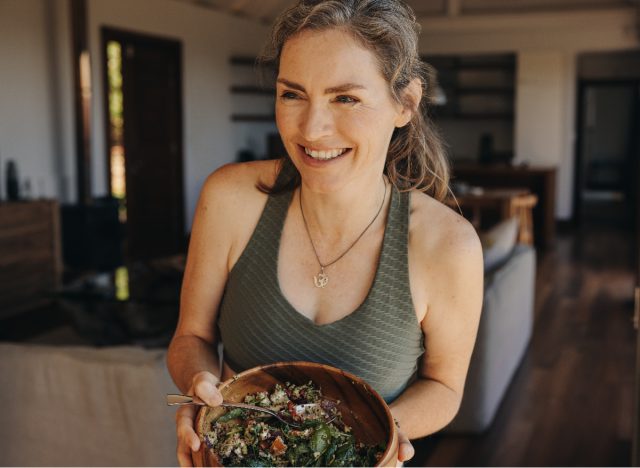Why Your Calorie Needs Change With Age

Calories are as essential to living as the oxygen you breathe. They supply your body with the energy it needs to maintain all of the processes that keep you alive, also known as your metabolism. Several factors determine how many calories your body needs to function properly. As you age, your calorie needs can change based on various factors, including your height, weight, body type, activity level, and daily habits.
Consider your calorie needs like a rough draft blueprint for building a new house. It provides a basic layout of what you’ll need, but you can adjust and personalize things like furnishings and decor to match your preferences.
Similarly, knowing your calorie needs gives you a solid starting point for your nutrition. Once you have a general idea of how many calories you need, you can adjust your diet to align with your specific health goals, such as tweaking the calories to help with weight loss or adjusting the types of foods you eat to help you manage blood sugar levels.
Infants and children need a lot of calories because their bodies grow quickly. Their calorie needs increase steadily as they grow to support their fast metabolism. Once you reach adulthood, your metabolism generally slows down, so your calorie needs tend to decrease. To support a faster metabolism, it’s helpful to follow a nutritious, protein-rich eating plan and engage in regular physical activity to maintain and, ideally, build muscle mass as you age.
What Are Calories and Their Importance?

A calorie is a unit of energy that fuels your body’s daily functions. When you eat, your body converts the food into energy that is either used right away or stored for later. On the one hand, if you consume more calories than you burn, the extra energy is stored as fat, eventually leading to weight gain. On the other hand, if you eat too few calories over a long period, your metabolism might slow down to conserve energy, making it harder to lose weight.
What Affects Your Calorie Needs at Any Age?

As you go through different life stages, your overall calorie needs tend to decrease. During childhood, when your body grows quickly, you need a lot of calories to support that growth. However, as you age and growth slows down, your calorie needs decrease. In young adulthood and beyond, the amount of calories you need is less about growth and more about your lifestyle, particularly your activity level.
Activity level is a major factor in determining your daily calorie needs. For example, if you compare two women of the same height and weight, one training for a half marathon and the other leading a mostly sedentary lifestyle, the athlete will need significantly more calories. This is because exercise burns more calories than resting, and the body also needs extra calories for recovery after exercise. These additional calories help replenish energy stores in the liver and muscles and support muscle repair and growth.
How Your Calorie Needs Change With Age:

As you enter adulthood and especially as you get older, your calorie needs generally decrease with each passing decade. This is partly because you might lose muscle and gain fat as you age. Since muscle burns more calories than fat, this shift in body composition can lower the number of calories you burn each day.
Additionally, activity often decreases with age due to factors like injuries or other physical limitations, which further reduces calorie expenditure. As you burn fewer calories, your body needs fewer calories to maintain its metabolism.
Tips for Tweaking Your Diet as You Age:

Healthy eating evolves with each stage of life. In youth, the focus is on growth, while in adulthood and beyond, it shifts toward preventing chronic diseases.
As you age, paying attention to calorie needs becomes less critical. Instead, the emphasis should be on eating various nutrient-dense foods that support bone and organ health.
For some, appetite decreases with age, which can lead to fewer calories being consumed each day and make it challenging to get enough essential vitamins, minerals, protein, and fiber. In your later years, it’s even more important to include protein in each meal and incorporate fruits and vegetables as much as possible to maintain overall health.
Jessica Wilson, MS, RD





